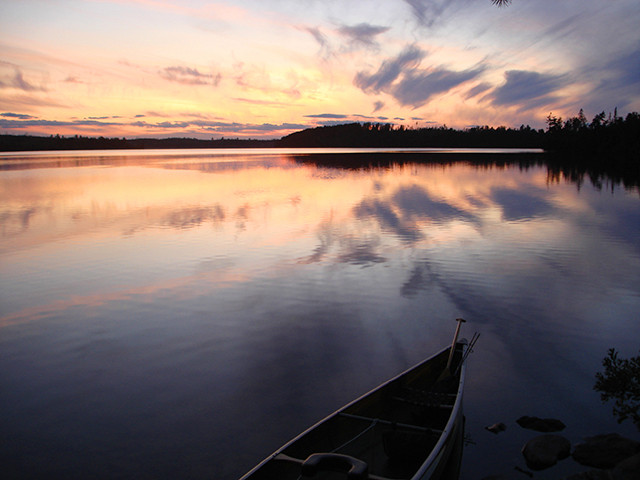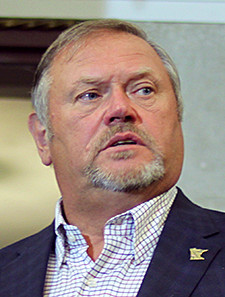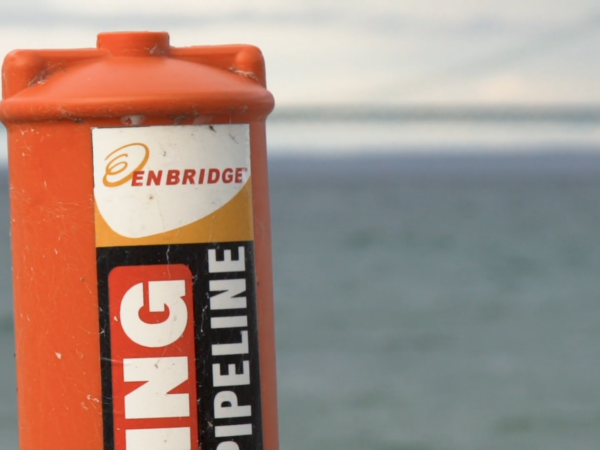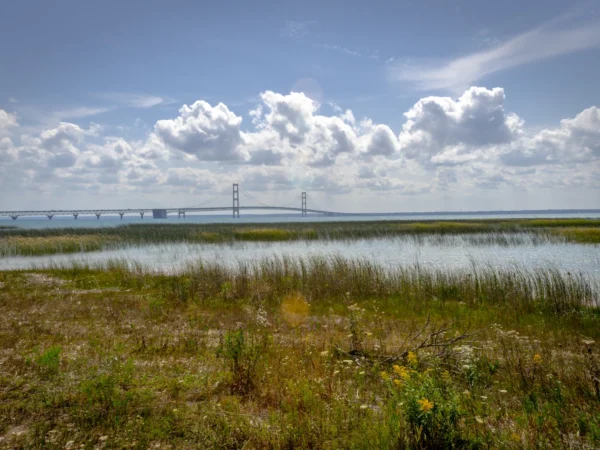
By Walker Orenstein and Gabe Schneider, MinnPost, through the Institute for Nonprofit News network
In late April, former Vice President Joe Biden’s campaign held a virtual event with Minnesota supporters to promote the Democrat’s plans to address climate change and a clean environment.
But while U.S. Sen. Tina Smith and other Biden surrogates talked about carbon-free energy, clean water, agriculture and electric cars, they did not touch on perhaps the two most controversial environmental issues in the state: copper-nickel mining in Northern Minnesota and the proposed Line 3 oil pipeline.
Many of the major Democratic candidates in the presidential race said they would oppose the Line 3 project, the proposed Twin Metals mine near Ely, or both if elected in the fall of 2020. Those stances heartened the environmentalist wing of the party and roiled trade unions and rural DFLers.
But as the nominating contest draws to a close, one of the few candidates to skip talking about the industrial projects is now the presumptive nominee, and the question remains: How would a Biden administration handle Twin Metals or Line 3?
A tale of two projects
Sen. Bernie Sanders was the first presidential hopeful to wade into local debate over Enbridge’s Line 3 pipeline. A month before launching his campaign in January of 2019, Sanders filmed a video with the advocacy group Honor the Earth to denounce the project.
Approved by the Public Utilities Commission but awaiting some state and federal permits, the $2.6 billion pipeline, if built, would travel 337 miles across northern Minnesota to Superior, Wisconsin. The new Line 3 is intended to replace a smaller pipeline built in the 1960s that is corroding and operating at half capacity.
Enbridge says the older line, which begins in Edmonton, is a spill risk, and the replacement project has drawn considerable support in Minnesota for the economic jolt it could bring to the state. But Line 3 has also drawn considerable opposition from environmentalists and some tribes, who argue new fossil fuel infrastructure could leak too, while also exacerbating climate change. The new, larger pipeline would transport 760,000 barrels of crude oil a day, though the ultimate carbon footprint of Line 3 is disputed; in lieu of building the pipeline, the oil could be transported by rail.
Others in the presidential primary followed Sanders’ lead. Before he left the race, Washington Gov. Jay Inslee told MinnPost in July that the pipeline should not be built. And in August, Sen. Elizabeth Warren of Massachusetts said in a tweet that the Line 3 pipeline “would threaten Minnesota’s public waters, lands, and agricultural areas important to several Tribal Nations.”
Warren was also the first candidate to weigh in on copper-nickel mining near the Boundary Waters Canoe Area Wilderness, an issue that has split Minnesotans over the risk sulfide mining can pose to water and the economic promise of a new mining industry. Twin Metals Minnesota, a subsidiary of the Chilean mining company Antofagasta, wants to build a mine near Ely that would sit a few miles outside the BWCA, but within the Rainy River watershed that drains into the wilderness.
Twin Metals began early stages of the Minnesota’s environmental review process in December, which will help determine whether the company can, as promised, prevent mine waste from leaching into nearby waters.
Yet in August, when Warren was surging in many polls, she posted a video before a rally in St. Paul, saying she would “stop all mining on federal public lands, including the Minnesota Boundary Waters.” (Mining is not allowed in the BWCA, but it is allowed in some areas within its watershed.)
The Campaign to Save the Boundary Waters, a prominent advocacy group pushing back against the Twin Metals project, sent a staff member to Iowa before the state’s caucuses to pitch candidates on taking up their cause. They were successful, securing endorsements from Warren and a slew of other candidates, including former South Bend mayor Pete Buttigieg, billionaire Tom Steyer, and New Jersey Sen. Cory Booker.
In January, the group told E&E news that they were hopeful that Biden would take a stance on copper-nickel mining. But that has yet to happen. A website for their political arm, the Boundary Waters Action Fund, currently lists two candidates in big bold letters: Sanders, who has an “A” rating from the group, and Biden, whose placard just says: “NO ANSWER.”
Minnesota Sen. Amy Klobuchar has said both projects should face thorough environmental review, but has also not said whether she thinks either should be built or stopped. Her Senate office has said the DFLer has “serious concerns” about mining near the Boundary Waters, though she ripped the Obama administration for canceling two mineral leases owned by the company. Those leases were later reinstated by President Donald Trump.

If mining runoff were to leach into the Boundary Waters, it could reach Canada, where government officials have expressed concern about the proposed mining project. (Creative Commons/Chad Fennell)
No answer then, no answer now
Biden never addressed Line 3 or Twin Metals during the primary campaign, and he has continued to avoid taking a stand now that he’s unopposed in the race. Biden’s campaign did not answer questions on Biden’s views and did not make the former VP or any surrogates available for an interview.
Biden’s campaign website outlines dozens of actions the candidate would take to address the environment, such as his pledge for the country to emit net-zero carbon emissions by 2050. And it makes some broader declarations, saying implementing the plan will drive an “innovation boom that helps us achieve the vision of a hemisphere that is secure, middle class, and democratic from Canada to Chile.”
The plan does mention extraction industries, like oil exploration, on federal lands. For example, Biden promises to prohibit oil and gas drilling in the Arctic National Wildlife Refuge and “protect other areas impacted by President Trump’s attack on federal lands and waters.” Biden would block new oil and gas permitting on public lands. “No more drilling on federal lands, period period period,” Biden said in New Hampshire in February.
Biden’s website also says he would set “new common standards for the greening of manufacturing, mining, and tourism.”
It’s not clear if or how any of those provisions would relate to Twin Metals or Line 3. But Biden’s time in the Obama administration — and those he’s chosen to speak on his behalf on the campaign trail — may yield some clues on his approach to Twin Metals and Line 3.
Obama’s government canceled the Twin Metals mineral leases and began study of copper-nickel mining in the Rainy River watershed that could have led to a 20-year ban on such extraction near the BWCA. One prominent Biden environmental advisor is Tom Vilsack, who led the Department of Agriculture when the USDA and the Interior Department considered that mining ban.
U.S. Rep. Betty McCollum of St. Paul, who has been an avid opponent of copper-nickel mining near the BWCA, appeared confident a Biden presidency would mirror Obama’s.
“Since it was the Obama-Biden administration who withdrew those mineral leases, initiated the environmental review, and proposed a ban on new mining in the watershed, we have no reason to expect that a Biden administration would change course,” said McCollum’s political director, Charlie Hammond.
The Obama administration also rejected the Keystone XL pipeline and a segment of the Dakota Access pipeline, two projects that have raised controversies similar to Line 3. Biden, however, has not signed a pledge to stop Keystone, which was approved by the Trump administration. Trump has been an ardent ally of oil pipelines and Minnesota copper-nickel mining while in office.
Biden has also recently talked with Inslee, who has endorsed Biden, about climate policy, though James Singer, a spokesman for Inslee, said the two have not discussed more specific issues like the BWCA or Line 3.
Rural Democrats warm to Biden, environmentalists disappointed
So far, rural Democrats, trade unions, and industry groups have been warmer to the former VP than they were to Warren.
 State Sen. Tom Bakk, a Cook DFLer and former Senate Minority Leader who has supported both projects, declined to be interviewed for this story, but endorsed Biden in March after telling the Star Tribune last year that Warren’s position “makes it hard to support the party.”
State Sen. Tom Bakk, a Cook DFLer and former Senate Minority Leader who has supported both projects, declined to be interviewed for this story, but endorsed Biden in March after telling the Star Tribune last year that Warren’s position “makes it hard to support the party.”
As Warren swung through St. Paul last August, Mike Syversrud, president of the Iron Range Building and Construction Trades Council, said it “pisses me off” the Democrat would take a position on Twin Metals before it had submitted a mine plan to state and federal regulators, and accused Warren of abandoning rural workers. Syversrud said by email last week it was premature to comment on Biden this early in his national campaign.
Kevin Pranis, a spokesman for the Minnesota and North Dakota chapter of the Laborers’ International Union of North America, said Minnesota’s government is primarily responsible for scrutinizing and permitting Line 3, and there’s little reason for a presidential candidate to take a stance on the project. His union would help build the pipeline.
Pranis noted the candidates who opposed Line 3 ultimately lost to Biden, who won handily in northern Minnesota. Northern Minnesota also was more favorable to Republicans in 2016 than in past presidential elections; union leaders say many of their members broke with the DFL to vote for Trump.
“I think if candidate Biden looks at the political map of Minnesota and observes what happened with the Trump election, he would be very wise to get on the ground and learn more about the regions where this pipeline project will create substantial private investment and economic activity and sustain career building trades members,” said Nancy Norr, who chairs the business, industry and trade union coalition called Jobs for Minnesotans.
Pranis said there “was a need for high quality blue-collar jobs” before the coronavirus pandemic, but that need is now “desperate” as taconite mines idle. Another copper-nickel mine proposed by PolyMet Mining could also undergo a new round of environmental review after its permits were struck down by an appeals court recently. That project sits in the Lake Superior watershed, which does not drain into the BWCA.
Juli Kellner, an Enbridge spokeswoman, and Julie Padilla, chief regulatory officer for Twin Metals, both said their projects would be economic sparks to northern Minnesota and pledged to work with all government officials. Kellner said the pipeline would put 4,200 people to work in “family sustaining construction jobs, with most hired from local union halls.” Twin Metals predicts it would create 700 direct jobs and 1,400 indirect ones — not counting union construction work to build the mine.
Meanwhile, Biden’s environmental plans have drawn rebukes or tepid support from many advocacy groups, including the Sunrise Movement and 350 Action, who see them as too modest. That’s despite Biden’s efforts to rally young progressives who supported Sanders, in part through his environmental policy.
A Star Tribune/MPR News poll in February also found opposition to Twin Metals may not be limited to a slice of progressive Democrats. Sixty percent of registered voters in the state opposed building new mines near the BWCA, according to the poll, while 22 percent support it. The poll did not name Twin Metals.
For Andy Pearson, a spokesman for MN 350, Biden’s approach to Line 3 is a disappointment.
Pearson said he’s seen a variety of environmental organizations try to get in touch with Biden’s campaign, but that Biden was avoiding “the lowest of the low hanging fruit” by not opposing oil pipelines like Line 3. While he said Biden’s plans have improved a “little bit over time,” he considers it “one of the weaker ones in the Democratic field.”
“I think that Biden needs to get with the program and come out in opposition to Line 3,” Pearson said.
Catch up on coverage of Twin Metals and Line 3 on Great Lakes Now:
Judge backs Minnesota’s Twin Metals mine in lease dispute
Minnesota regulators put Enbridge Line 3 oil pipeline back on track
No major impacts on Lake Superior found from Line 3 pipeline
This article, first published in MinnPost, is republished here through Great Lakes Now’s membership in the Institute for Nonprofit News, a network of more than 200 nonprofit newsrooms across the U.S., working to strengthen the sources of trusted news for thousands of diverse communities.
MinnPost is a nonprofit, nonpartisan media organization whose mission is to provide high-quality journalism for people who care about Minnesota.
Featured image: Former Vice President Joe Biden never addressed Line 3 or Twin Metals during the primary campaign, and he has continued to avoid taking a stand now that he’s unopposed in the race. (REUTERS/Carlos Barria via MinnPost)
1 Comment
-
this is not an accident man……




